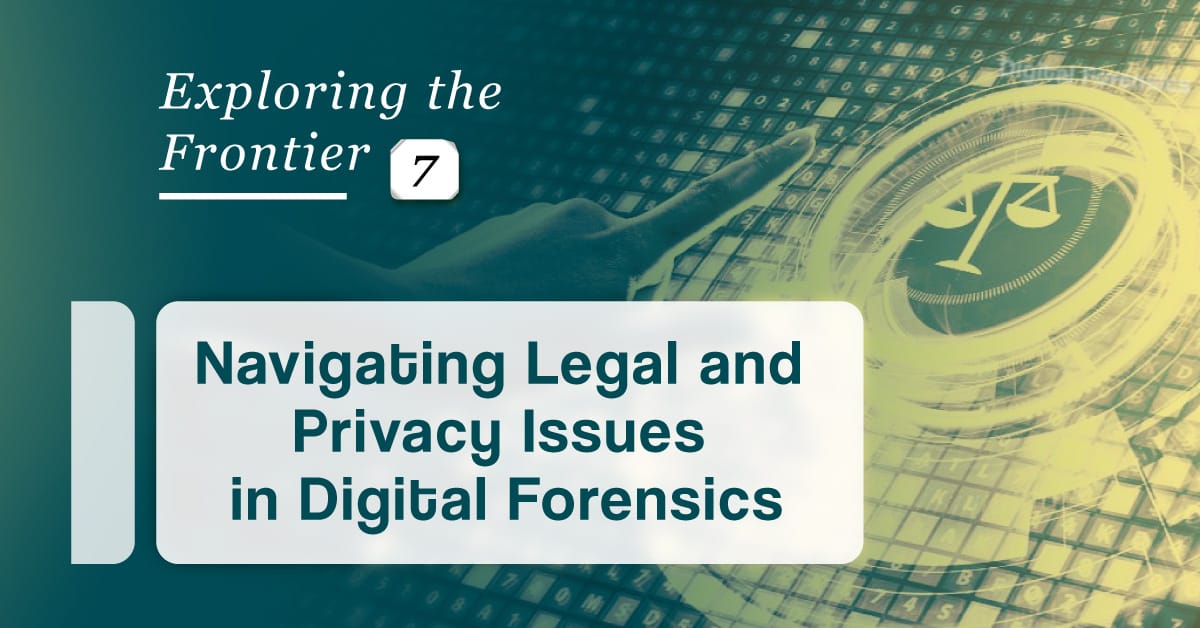Contributed by: Matt Cooper, Licensed Private Investigator, Former Law Enforcement Detective
As digital forensics continues to evolve, the legal and ethical landscape surrounding it has become increasingly complex. The very nature of digital investigations, where vast amounts of personal and sensitive information are often accessed, places data privacy and legal issues at the forefront of forensic practice. Professionals in this field are not only tasked with uncovering the truth but also ensuring that the methods they use to do so comply with laws and respect privacy rights.
In this 7th article of our series, “Top 10 Hottest Topics in Digital Forensics for 2024,” we explore the critical legal and privacy challenges facing digital forensic experts today. From navigating ever-evolving data protection regulations to ensuring the admissibility of digital evidence in court, these issues have significant implications for how digital investigations are conducted and their outcomes.
The Intersection of Digital Forensics and Legal Obligations
As digital forensics continues to play a pivotal role in both criminal and civil investigations, forensic professionals must be acutely aware of the legal frameworks that govern their work. Digital evidence, which can range from emails and text messages to entire databases, must be collected, handled, and analyzed in a way that preserves its integrity and ensures its admissibility in court.
One of the most pressing issues in this area is the Chain of Custody. This refers to the documentation and safeguarding of evidence from the moment it is collected to when it is presented in court. Any break in this chain could result in the evidence being inadmissible. As more data is stored and transferred through digital mediums, maintaining a secure and documented chain of custody has become more challenging yet remains absolutely vital.
Additionally, as digital forensics grows more prevalent in international cases, cross-border legal challenges arise. Different countries have varying laws regarding digital evidence, and what is legally obtained in one jurisdiction may not be admissible in another. Forensic professionals must be adept at navigating these international legal complexities to ensure that their investigations do not violate the laws of any country involved.
Data Privacy and the Forensic Investigator’s Dilemma
One of the most significant challenges facing digital forensic professionals today is balancing the need for thorough investigations with the growing importance of data privacy. Laws like the General Data Protection Regulation (GDPR) in Europe and the California Consumer Privacy Act (CCPA) in the United States have heightened the standards for how personal data should be handled and protected.
These laws impose strict requirements on how data is collected, stored, and processed. For example, GDPR requires explicit consent for collecting personal data and mandates that individuals have the right to request the deletion of their personal information. For digital forensic experts, this means that while investigating, they must be careful not to overstep privacy rights or violate data protection laws. Failure to do so could result in hefty fines or, worse, taint an investigation and make the evidence inadmissible.
Moreover, as privacy laws are updated and expanded globally, forensic professionals must stay abreast of these changes. For instance, the increasing use of encryption by individuals and companies alike has presented forensic experts with new challenges. While encryption ensures data privacy, it can also make accessing crucial digital evidence difficult, creating a legal and ethical gray area when it comes to forcing decryption.
Ensuring Admissibility in Court
Another key consideration for digital forensic professionals is the admissibility of digital evidence. In many legal systems, the rules for admitting evidence are strict, and digital evidence is no exception. Courts require that digital evidence be relevant, authentic, and obtained legally. If it doesn’t meet these criteria, it can be excluded, which could jeopardize the entire case.
In recent years, there has been growing scrutiny over how digital evidence is collected and presented in court. Legal teams may challenge whether the evidence was collected in a way that violated privacy rights or whether it was tampered with. In some cases, courts may require expert testimony to explain how the digital evidence was handled and whether it meets the necessary standards of authenticity and reliability.
This makes it crucial for forensic professionals to have a deep understanding of legal precedents and rules of evidence, particularly in cases where the law has yet to catch up to the realities of digital technology fully. Courts are increasingly looking to forensic experts to provide clarity on how digital evidence is sourced, processed, and analyzed to ensure that it can be used fairly in legal proceedings.
The Need for Ongoing Legal Education
Given the rapid evolution of both technology and the legal frameworks that govern it, ongoing education is essential for digital forensic professionals. Staying current on data privacy regulations, cybersecurity laws, and forensic best practices is critical to ensuring that investigations are legally sound and ethically conducted.
Organizations that provide digital forensics services must prioritize regular training and collaboration with legal experts. This ensures that forensic investigators are up-to-date on the latest legal requirements and are prepared to navigate the complexities of privacy and admissibility issues in court.
Conclusion
As we look to 2025 and beyond, the legal and privacy issues surrounding digital forensics are only going to become more prominent. With stricter data privacy laws, the growing complexity of international cases, and increasing scrutiny of digital evidence in court, forensic professionals face new challenges every day. By staying informed and maintaining a meticulous approach to legal compliance, they can continue to provide valuable insights while respecting the privacy and rights of individuals.
As the digital landscape changes, one thing remains clear: legal and privacy issues will continue to shape the future of digital forensics, making it one of the hottest topics to watch in the coming years.







